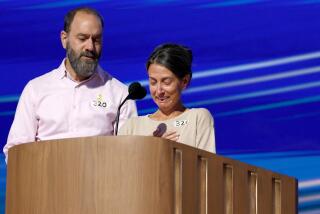Conference Speakers Test Heady Freedom : Debates Astonish Soviet Citizens
- Share via
MOSCOW — At first, they spoke carefully, each in turn probing the boundaries of a new, heady freedom.
But by the time the Communist Party’s four-day conference ended at 11 p.m. Friday, most of the 5,000 delegates realized there was no need for inhibition.
As they and an incredulous Soviet public watched the unfolding of one of the most candid debates ever held in the country, it was clear a new era had dawned: Both at and around this extraordinary forum, there suddenly were no boundaries.
“It’s like a serialized detective story,” one eager Muscovite said before the final day’s session. “Every night we wait for the next chapter.”
In one of the conference’s most dramatic moments, a fiery delegate from the Komi region, Vladimir I. Melnikov, sent a note to the podium complaining that the same old voices were talking. The next day, Melnikov was the first to speak--and, to a stunned gathering, demanded the resignation of no less a figure than Soviet President Andrei A. Gromyko.
Charges and countercharges flew over the Kremlin auditorium and over the airwaves into the millions of Soviet living rooms.
Issue of Stock Exchange
One delegate, speaking at a news conference outside the Kremlin, even raised the prospect that the modernization of Soviet industry might be financed through a stock exchange. That idea, if even whispered a few years ago, would probably have earned him a demotion into obscurity.
“It is not under consideration yet,” Evard Figuranov, a member of the party Central Committee’s economic department, said later. “But I think it will come.”
Initial public skepticism vanished as families crowded around television screens each evening for two hours of no-holds-barred highlights of the day’s debate.
Within minutes after the conference broke up Friday, knots of people had gathered in Pushkin Square, the small park where political protests have frequently occurred during the Gorbachev years.
There, in the humid night air, more than 100 people argued about the meaning of the events they had witnessed over the previous days.
“You are a party member. I am not, but let me tell you . . . ,” went one exchange.
A few yards away, a cluster that included members of the Democratic Union, a small dissident group advocating an end to the Communist Party’s monopoly of the political process, argued about the meaning of Mikhail S. Gorbachev’s plan to limit the party’s role in Soviet society.
Well into today’s early hours, the discussions were still in full swing.
Earlier in the week, Soviet citizens had watched a Moscow party secretary drowned out with slow hand claps for a boring, self-promoting presentation and Gorbachev rage at one of his principal economic advisers, Leonid Abalkin, for questioning elements of proposed reforms.
They listened to the disgraced former Moscow party boss, Boris N. Yeltsin, make an impassioned appeal for the conference to rehabilitate him--and be rejected. They learned that Gorbachev rose to power on the votes of three of the hard-line “old guard” Politburo--Gromkyo, KGB chief Viktor B. Chebrikov and Yegor K. Ligachev, the party’s No. 2 man.
As the debate gathered momentum, emboldened delegates attacked the press for abusing their newly found freedom, demanded to know who did what in the shadowy world of the Politburo, the Soviet Union’s small inner circle of leaders, and wanted detailed financial statements from Central Committee members.
The intense, introspective search for a new political direction also provided insights into the often bizarre routine of Soviet life.
Kakhar M. Makhkamov, the party leader from the central Asian Republic of Tajikistan, complained that Soviet decision-making was so centralized that he spent virtually the entire year in Moscow, arguing over minor points.
Tenghiz Abuladze, producer of a compelling film on the Stalinist era, “Repentance,” noted that decisions regarding the proper pronunciation of Georgian words were not made anywhere in the Georgian Republic, but in Moscow.
A small office at one of the Kremlin gates handled thousands of handwritten proposals for the conference submitted by members of the public, many calling for an extension of Gorbachev’s liberalization policies.
The party conference also provided the Soviet public with a rare, prolonged close-up of the man who wants to transform their lives. And for some, the result was unsettling.
“He’s too much the master of the situation,” declared one Muscovite. “There no sense of a democrat in him, and that frightened me.”
Another said he did not like the way Gorbachev pointed his finger at people and argued that he handled the conference as if he were a father dealing with children.
But generally, the Soviet leader got positive reviews for his performance. And few who watched his steady eye, his quick rejoinders and occasional wry smile were left with any doubts that they were watching a man who believes he is firmly in command.
As the 5,000 delegates concluded the first party conference in 47 years by singing the “Internationale,” one voice boomed out above the rest--the voice of Mikhail S. Gorbachev.
More to Read
Sign up for Essential California
The most important California stories and recommendations in your inbox every morning.
You may occasionally receive promotional content from the Los Angeles Times.













